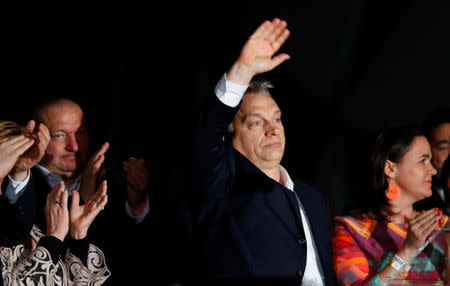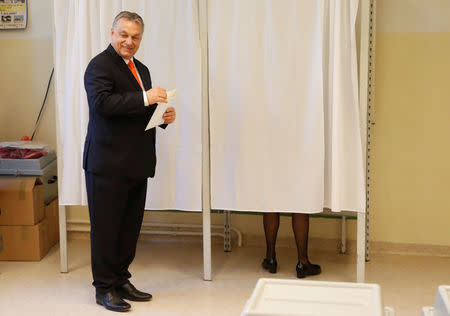From liberal hero to right-wing icon, Orban's appeal trumps rivals
By Gergely Szakacs and Krisztina Than
BUDAPEST (Reuters) - An anti-Communist hero to many, Hungary's longest-serving prime minister Viktor Orban has veered far from his formative liberal views to become a staunch opponent of immigration, admired by the far right across Europe.
The 54-year-old Hungarian premier, who secured a third straight term in office in elections on Sunday, has set out to transform Hungary into an "illiberal democracy" with sweeping reforms in the past years that have earned him accusations of authoritarianism and conflicts with the European Union.
A right-wing icon who is able to bring tens of thousands of supporters into the streets, Orban is seen by his opponents as a populist, who has used his strong political mandate to cement his powers and squeeze civil organisations that are critical of his government's policies.
When he lost the 2006 vote to the Socialists, the second parliamentary election defeat in a row, some analysts doubted Orban would ever be able to climb back and win again.
But he won elections with a landslide in 2010, and has since consolidated his stance as a leader of an anti-migrant axis on the eastern flank of the European Union.
No one in his Fidesz party has seriously challenged his position as a leader, not even in the most difficult times.
"The defining feature of Orban's career has been a zeal to defend Hungary's sovereignty against foreign encroachment," said Hendrik Hansen, a political scientist at Andrassy University in Budapest.
With a message that he stands for all Hungarians against foreign meddling, Orban tapped into feelings shared by many Hungarians who perceive threats to their national identity and feel they are treated as second-class citizens in the EU.
A keen amateur soccer player, Orban also appeals to many ordinary people with his down-to-earth approach, even though most of his encounters with citizens these days are well-staged and closely guarded events, rather than spontaneous meetings.
He seized the moment when on Jan. 12 2015, months before the peak of the migration crisis in Europe, he said immigration into Europe should be largely halted after Paris attacks launched by Islamist extremists, who were born in France to immigrant families.
"We should not look at economic immigration as if it had any use, because it only brings trouble and threats to European people," he told state television. "Therefore, immigration must be stopped. That's the Hungarian stance."
"We do not want to see a significant minority among ourselves that has different cultural characteristics and background. We would like to keep Hungary as Hungary," he said.
In August 2015, hundreds of thousands of asylum seekers entered Hungary from the Balkans, en route to western Europe.
In September, Orban's government erected a fence on the Serbian border to keep them out, and the unrelenting anti-immigration stance has been central to his policies ever since.
This has earned Orban respect from prominent far-right politicians in western Europe.
"Orban has more backbone and character than all the cowards of the EU combined," Geert Wilders, chairman of the Dutch anti-Islam Party for Freedom said in a tweet in April 2017.
"I respect Viktor Orban and his courage because he had the strength to face the European Union that threatened and blackmailed him," French far-right leader Marine Le Pen, president of the National Front, said in an interview to Hungarian Echo TV via an interpreter last month.
A FIGHTER
Orban rose to fame when, in 1989, he stood up and demanded Soviet troops get out of Hungary during a ceremony for the reburial of former prime minister Imre Nagy, who led an anti-Soviet uprising.
Since the first post-communist democratic election in 1990, when his liberal party first got into parliament, he has transformed Fidesz into a mainstream right-wing conservative group.
Some analysts said during the 2018 election campaign, Orban's Fidesz actually swapped places with former far right party Jobbik, which has been trying to rebrand itself as a more moderate force.
"He (Orban) is a true fighter, and he even needs the fight in order to survive," political scientist Hansen said.
A trained lawyer who studied political philosophy at Oxford University, Orban is a strategist planning for the long term.
The big question is what he will use his renewed political mandate for.
Gabor Borokai, a former government spokesman for Orban, said the campaign diverted public discourse from key issues, such as the emigration of Hungarians to western Europe, or the poor state of the health care system.
In an editorial in the weekly Heti Valasz before the vote, editor-in-chief Borokai cited Orban's recent track record in a decades-long list of political disappointments, saying the key question of the election was whether it would produce any change.
"Whether there will be a Hungary, where co-operation means more than just a slogan," Borokai wrote. "Where problems are not swept under the carpet of the migration crisis."
(Writing by Krisztina Than; Editing by Stephen Powell)




